On August 11, Lola met Kyril, the self-professed love of her life. He proposed on the 15th, moved in on the 17th, and they married. This could be a modern love story, except it took place in the late 1930s in Eastern Europe when Joseph Stalin and Adolph Hitler were tossing lives into disarray. The story of Lola and Kyril is just one episode in Julia Alekseyeva’s richly-illustrated memoir Soviet Daughter: A Graphic Revolution.
NewPages Blog
At the NewPages Blog readers and writers can catch up with their favorite literary and alternative magazines, independent and university presses, creative writing programs, and writing and literary events. Find new books, new issue announcements, contest winners, and so much more!
Soviet Daughter
Spread the word!
Unruly Creatures
Unruly Creatures is aptly named, and it is as unusual and wild as the title forebears. Jennifer Caloyeras colors outside the lines in in this collection. The stories are at once beautiful and tragic, comedic and full of sorrow, as well as strange and telling. Each story is wildly original, and seamlessly comments on current events. Caloyeras’s talent shines through the pages of this collection, latching on to the reader and refusing to be put down.
Spread the word!
Liars
Are you happy? What is the source of your happiness? Would you say it’s love? Steven Gillis provides us with a few different answers to these questions in his new novel Liars. His characters find themselves either concretely sure of themselves, or questioning everything they know in this thrilling, somber story of a man trying to understand love.
Spread the word!
Lit Mag Covers :: Picks of the Week
 Halloween, detail by Bo Bartlett, is seasonally appropriate for the Autumn 2017 cover of The Gettysburg Review. More of Bartlett’s work is also featured in a full-color portfolio inside the publication.
Halloween, detail by Bo Bartlett, is seasonally appropriate for the Autumn 2017 cover of The Gettysburg Review. More of Bartlett’s work is also featured in a full-color portfolio inside the publication.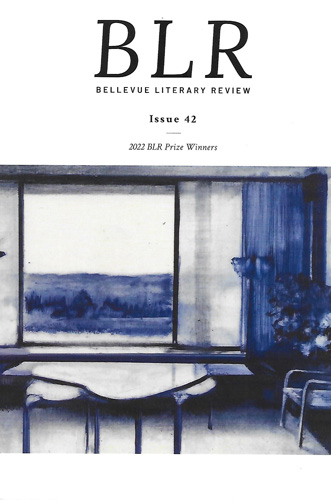 “Finding Home: Family & Connections” is the theme of Bellvue Literary Review‘s Fall 2017 issue, with cover art and internal portfolio by father and son Paul and John Paul Caponigro.
“Finding Home: Family & Connections” is the theme of Bellvue Literary Review‘s Fall 2017 issue, with cover art and internal portfolio by father and son Paul and John Paul Caponigro.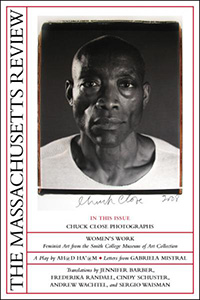 The Massachusetts Review “back-to-school” fall 2017 issue features “He Who Is as if Death Were Not,” an archival pigment print on German etching paper from Ayana V Jackson‘s series To Kill or Allow to Live in the issue.
The Massachusetts Review “back-to-school” fall 2017 issue features “He Who Is as if Death Were Not,” an archival pigment print on German etching paper from Ayana V Jackson‘s series To Kill or Allow to Live in the issue.
Spread the word!
Boulevard Symposium Confronts Campus Demonstrations
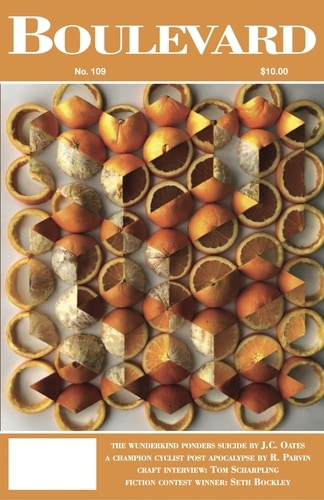 Boulevard‘s fall symposium on campus protests includes essays by Jim Craig, Megan Giddings, Ena Selimovic, Andrew Weinstein, and Robert Zaller responding to the question: “Have the recent campus protests – ranging from demonstrations to the use of safety spaces – against mainly right-wing speakers contributed to a dumbing down of American colleges, or are they effective and necessary?”
Boulevard‘s fall symposium on campus protests includes essays by Jim Craig, Megan Giddings, Ena Selimovic, Andrew Weinstein, and Robert Zaller responding to the question: “Have the recent campus protests – ranging from demonstrations to the use of safety spaces – against mainly right-wing speakers contributed to a dumbing down of American colleges, or are they effective and necessary?”
Spread the word!
Alaska Quarterly Review Calls for Redoubled Efforts
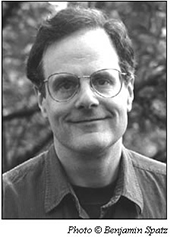 Celebrating its 35th Anniversary, Alaska Quarterly Review Editor-in-Chief Ronald Spatz, while marking the milestone with gratitude, considers this passage of time and what AQR, like many literary publications, has witnessed. “In the past we counted on artists, scholars, scientists, and journalists as reliable firewalls against ignorance. But increasingly there are powerful efforts to silence or marginalize these agents of understanding and change . . . as writers, poets, editors, and publishers, we must redouble our efforts to seek truth in all of its parts while creating every possible opportunity for compassion and empathy. In our view, the role of the arts has simply never been more crucial.”
Celebrating its 35th Anniversary, Alaska Quarterly Review Editor-in-Chief Ronald Spatz, while marking the milestone with gratitude, considers this passage of time and what AQR, like many literary publications, has witnessed. “In the past we counted on artists, scholars, scientists, and journalists as reliable firewalls against ignorance. But increasingly there are powerful efforts to silence or marginalize these agents of understanding and change . . . as writers, poets, editors, and publishers, we must redouble our efforts to seek truth in all of its parts while creating every possible opportunity for compassion and empathy. In our view, the role of the arts has simply never been more crucial.”
Spread the word!
New England Review on the Violence that Surrounds Us
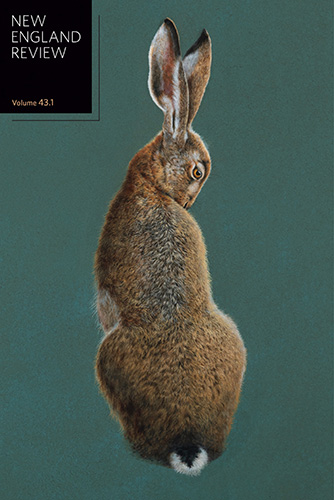 New England Review Editor Carolyn Kuebler writes in the 38.3 Editor’s Note that, while the twenty-three pieces in issue 38.3 (2017) were not chosen for nor do they have a focused message or singular theme, “. . . it surprised me to see how frequently the shadow of war—to take one obvious example of a culture of violence—darkened the edges of these disparate writings. With the world always in the throes of some violence or other, it’s no wonder; whether we’re civilians or soldiers or doctors, we all become part of it. Born during the Vietnam War, finishing college at the start of the Gulf War, and then becoming a parent during the War on Terror, I’ve learned that being in a state of war doesn’t always have a clear beginning and end, and now it’s not even always clear where the war is actually happening and who’s fighting it. It’s not just in this magazine or in this moment in time that writers are contending with such themes; it’s always.”
New England Review Editor Carolyn Kuebler writes in the 38.3 Editor’s Note that, while the twenty-three pieces in issue 38.3 (2017) were not chosen for nor do they have a focused message or singular theme, “. . . it surprised me to see how frequently the shadow of war—to take one obvious example of a culture of violence—darkened the edges of these disparate writings. With the world always in the throes of some violence or other, it’s no wonder; whether we’re civilians or soldiers or doctors, we all become part of it. Born during the Vietnam War, finishing college at the start of the Gulf War, and then becoming a parent during the War on Terror, I’ve learned that being in a state of war doesn’t always have a clear beginning and end, and now it’s not even always clear where the war is actually happening and who’s fighting it. It’s not just in this magazine or in this moment in time that writers are contending with such themes; it’s always.”
Read the full editorial here and access full-text of several works from this issue, including Louise Aronson’s “Necessary Violence.”
Cover: Warfare by Sabra Field
Spread the word!
New Lit on the Block :: Virga
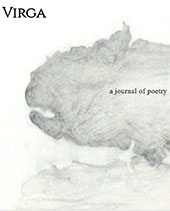 Virga is the name for the cloud streaks that stream hazily down from the sky, snow or rain precipitation that evaporates before having a chance to reach the ground. Virga can often fool radar into recording precipitation while the ground remains dry. Perhaps in this same way, poetic and hybrid forms can be as elusive as nature herself, and why Virga is an appropriate name for new online literary biannual dedicated to poetry and hybrid writing. Continue reading “New Lit on the Block :: Virga”
Virga is the name for the cloud streaks that stream hazily down from the sky, snow or rain precipitation that evaporates before having a chance to reach the ground. Virga can often fool radar into recording precipitation while the ground remains dry. Perhaps in this same way, poetic and hybrid forms can be as elusive as nature herself, and why Virga is an appropriate name for new online literary biannual dedicated to poetry and hybrid writing. Continue reading “New Lit on the Block :: Virga”
Spread the word!
Still Point Arts Quarterly – Fall 2017
Still Point Arts Quarterly recently announced their switch from print issues to free, online issues delivered directly to readers’ email inboxes. The Fall 2017 issue is the first readers can access online, the current exhibition feature containing works based on “The Art of Structure.”
Spread the word!
Lime Hawk – August 2017
Connecticut-based, online Lime Hawk provides readers with “creative works that muse on environment, culture, and sustainability.” Issue 12 contains 15 pieces of poetry, prose, art, and filmography, and the website has a calm and quiet theme, gray text boxes floating over a mountain scene, which further sets the mood for the new work.
Spread the word!
Basalt – 2017
“Dark-colored, fine-grained,” reads the subtitle to basalt, the Oregonian journal named after the volcanic rock with those same dark, fine properties. Basalt is formed from surface lava cooling, and the poetry and art within the 2017 issue mimics its namesake, rising up as a strong finished product built from an eruption of words.
Spread the word!
Into the Void – Summer 2017
Published out of Dublin, Ireland, Into the Void pushes the boundaries of comfort and vulnerability. Nothing is safe or simple. Through fiction, creative nonfiction, poetry, and art, this issue doesn’t try to clean up the rough edges of literature. Into the Void refuses to apologize for the imperfections, and vulnerabilities.
Spread the word!
BOMB Magazine – Summer 2017
BOMB puts artists in conversation with each other. In the Summer 2017 issue, art is broadly defined and equally celebrated: poets and directors and architects, all are welcome at the table to open up the discussion on art, its legacy, history, and future. Particularly through reviews and interviews, BOMB lays bare artists’ inspiration, where creators and their creations speak to each other across time.
Spread the word!
Nimrod International Journal – Spring/Summer 2017
In this issue of Nimrod International Journal, the theme of “Leaving Home, Finding Home” pulled at my heart strings, reminding me of homes I have found and homes I have left. I spent days pouring over the pages of this journal, unwilling to set it down, each piece reaching out to me in happiness or in sadness, painting stories I could dive into.
Continue reading “Nimrod International Journal – Spring/Summer 2017”
Spread the word!
Books :: September 2017 Prize Winners
 September is a busy month for award-winning book releases. Here is just a sampling of small press and university press titles readers can look for this month.
September is a busy month for award-winning book releases. Here is just a sampling of small press and university press titles readers can look for this month.
At the beginning of September, Southeast Missouri State University Press published the winner of the 2015 Nilsen Literary Prize for a First Novel: Pie Man by John Surowiecki. The debut novel is told through a series of reminiscences by the titular character’s family, friends, and teachers, and explores the story of a boy, Adam Olszewski, who on his seven birthday tries to leave his family house but can’t. Soon after, the boy believes the house is alive and an inseparable part of him. Pie Man is a vivid exploration of what it means to be normal.
A Brief Alphabet of Torture: Stories by Vi Khi Nao, winner of the FC2 Ronald Sukenick Innovative Fiction Prize, is also out this month. A Brief Alphabet of Torture is made of many modes and genres—poetry, essay fiction, drama—and almost constitutes a novel of a different kind. Each tale is a chapter that captures the concerns that pervade life.
In poetry, readers can pick up a copy of To Whitey & the Crackerjack by May Yang (Hauntie), winner of the 2016 Robert Dana Anhinga Prize, selected by Evie Schockley. Shockley says of her selection: “May Yang’s poetry pierces the silence in which the history of Hmong women has been blanketed, with indecorous wordplay, unruly rhymes, and evocative, unequivocal images. This book begins by naming names (America, global capitalism) and ends by revivifying the poetic epigram.”
Check out the publishers’ websites to learn more about these newly-releaed, award-winning titles.
Spread the word!
2017 Laux/Miller Poetry Prize Winners
The Fall 2017 issue of Raleigh Review features the 2017 Laux/Miller Poetry Prize winner, finalists and honorable mentions:
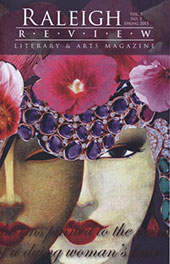 Winner
Winner
Kristin Robertson – “Poem for My Unborn Daughter”
Honorable Mention
Jenna Bazzell – “All Is Wild, All Is Silent”
Finalists
Emily Paige Wilson – “Reasons to Return Home”
Emily Rose Cole – “How Not to Remember Your Mother”
Jenna Bazzell – “The Speaker’s Prayer”
Mario Ariza – “Erratic transcription of notes taken at a refugee camp in Anse-A-Pitre, Haiti”
Several of the works as well as other content from this issue can be read online here.
Spread the word!
New Lit on the Block :: Embark
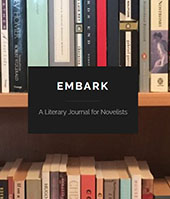 Teaching a course in The Novel, I took my students to the fiction section of the library and had them pull down books at random and simply read the first several pages, sometimes just the first sentence. I wanted them to sample as many “beginnings” as they could, then comment on the exercise. Some said they liked it as a way to consider a lot of books and see which one might grab their interest; overwhelmingly, they all wanted to go back and keep reading at least one or more of what they had sampled. Now, imagine this experience of sampling first chapters at your fingertips, on the computer, in one publication, and you will have imagined Embark. Continue reading “New Lit on the Block :: Embark”
Teaching a course in The Novel, I took my students to the fiction section of the library and had them pull down books at random and simply read the first several pages, sometimes just the first sentence. I wanted them to sample as many “beginnings” as they could, then comment on the exercise. Some said they liked it as a way to consider a lot of books and see which one might grab their interest; overwhelmingly, they all wanted to go back and keep reading at least one or more of what they had sampled. Now, imagine this experience of sampling first chapters at your fingertips, on the computer, in one publication, and you will have imagined Embark. Continue reading “New Lit on the Block :: Embark”
Spread the word!
2017 Dogwood Literary Prize Winners
Dogwood Issue 16 features the winners of their 2017 Literary Prizes:
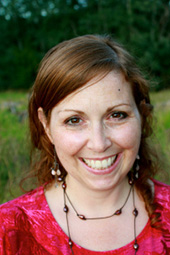 Grand Prize Winner
Grand Prize Winner
Judge Michele Glazer
Laura Read’s poem “Margaret Corrine, Dunseith, North Dakota, 1932”
$1000 and publication
[Laura pictured]
First Prize in Nonfiction
Judge Sarah Einstein
Natasha Sajé’s essay “Guilt: A Love Story”
$250 and publication
First Prize in Fiction
Judge Karen Osborn
J. Stillwell Powers’ story “Salvage”
$250 and publication
Read full judge’s comments here.
Spread the word!
Bennington Review Predicted More Threat than Expected
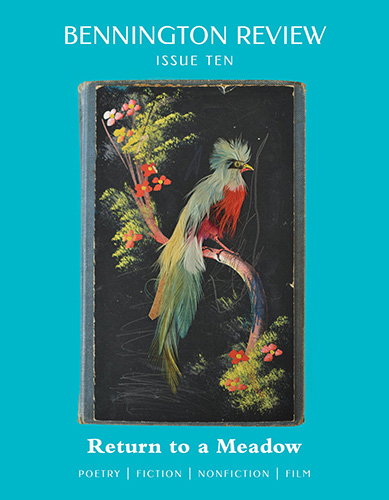 “The decision to consider the work in the current issue of Bennington Review through the lens of threat,” writes Editor Michael Dumanis, “- be this threat political, global, localized, or existential – was made during an uncharacteriscially emotional editorial meeting on Thursday, November 10, 2016, two days after a certain historical event. We felt completely unprepared to imagine what might come next. Animated by collective anxiety – this sense of abrupt dislocation of expectaions, as well as new actual danger – we gravitated toward poems and stories and essays where paradigms were similarly disrupted, where characters suddenly found themselves destabalized by external forces, where institutions and individuals in which we’d placed our trust failed to hold up their end of the bargain.”
“The decision to consider the work in the current issue of Bennington Review through the lens of threat,” writes Editor Michael Dumanis, “- be this threat political, global, localized, or existential – was made during an uncharacteriscially emotional editorial meeting on Thursday, November 10, 2016, two days after a certain historical event. We felt completely unprepared to imagine what might come next. Animated by collective anxiety – this sense of abrupt dislocation of expectaions, as well as new actual danger – we gravitated toward poems and stories and essays where paradigms were similarly disrupted, where characters suddenly found themselves destabalized by external forces, where institutions and individuals in which we’d placed our trust failed to hold up their end of the bargain.”
See a full table of contents with several sample works from the issue here.
Cover image by Prague-based artist Jakub Geltner: “Cultural Landscape.”
Spread the word!
Wanted :: Environmental Issues Writing
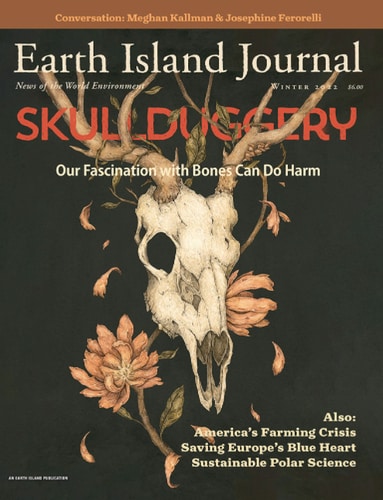 Earth Island Journal is an online magazine that “consistently delivers environmental stories that mainstream media often fail to cover.” As such, writers who have “distinctive stories that anticipate environmental concerns before they become pressing problems, stories that scan the horizon for the next big issue” will find a place for their work here. Earth Island Journal is a paying market for articles on the full spectrum of environmental issues and success stories of individuals and communities defending and restoring the Earth. Each issue also includes the feature “1,000 Words,” focusing on environmental artists and their works.
Earth Island Journal is an online magazine that “consistently delivers environmental stories that mainstream media often fail to cover.” As such, writers who have “distinctive stories that anticipate environmental concerns before they become pressing problems, stories that scan the horizon for the next big issue” will find a place for their work here. Earth Island Journal is a paying market for articles on the full spectrum of environmental issues and success stories of individuals and communities defending and restoring the Earth. Each issue also includes the feature “1,000 Words,” focusing on environmental artists and their works.
Spread the word!
Lit Mag Covers :: Picks of the Week
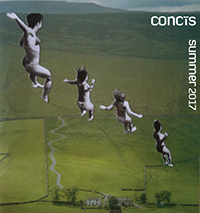 “Field Tripping” by Katie Buchan is the eye-catching cover on the concīs Summer 2017. This online and e-pub journal devoted to brevity is available as PDF download.
“Field Tripping” by Katie Buchan is the eye-catching cover on the concīs Summer 2017. This online and e-pub journal devoted to brevity is available as PDF download.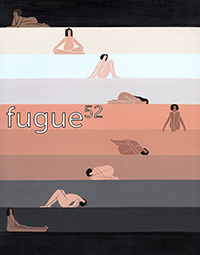 “The Spaces Between” by Laura Berger is featured on the cover of the online issue of Fugue (52). Managed and edited by graduate students in the English and Creative Writing Programs at University of Idaho, Fugue features poetry, plays, fiction, essays, visual-text hybrids, and interviews.
“The Spaces Between” by Laura Berger is featured on the cover of the online issue of Fugue (52). Managed and edited by graduate students in the English and Creative Writing Programs at University of Idaho, Fugue features poetry, plays, fiction, essays, visual-text hybrids, and interviews.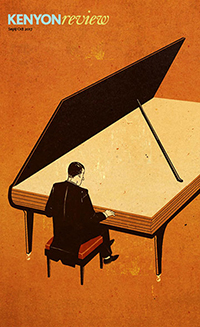 Do I pick EVERY Kenyon Review cover? Maybe, but when covers make me laugh or do a double take, that’s worth sharing. The artist is Milan, Italy-based Emiliano Ponzi.
Do I pick EVERY Kenyon Review cover? Maybe, but when covers make me laugh or do a double take, that’s worth sharing. The artist is Milan, Italy-based Emiliano Ponzi.
Spread the word!
New Lit on the Block :: Sky Island Journal
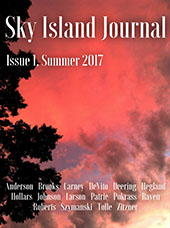 Born in the southern reaches of Arizona and New Mexico, Sky Island Journal is a new, open access online quarterly of poetry, flash fiction, and brief creative nonfiction. Just like its unique geographical namesake, Sky Island Journal promises, “as a writer, no matter who you are, where you’re from, or what you write about – if you’ve ever felt a connection to landscapes, art, or people, your writing might very well find a home with us. As a reader, you’re in for a real treat.” Continue reading “New Lit on the Block :: Sky Island Journal”
Born in the southern reaches of Arizona and New Mexico, Sky Island Journal is a new, open access online quarterly of poetry, flash fiction, and brief creative nonfiction. Just like its unique geographical namesake, Sky Island Journal promises, “as a writer, no matter who you are, where you’re from, or what you write about – if you’ve ever felt a connection to landscapes, art, or people, your writing might very well find a home with us. As a reader, you’re in for a real treat.” Continue reading “New Lit on the Block :: Sky Island Journal”
Spread the word!
Michigan Quarterly Review Tribute to Vicki Lawrence
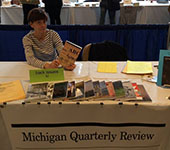 In its Spring 2017 issue, Michigan Quarterly Review editor, Jonathan Freedman, offers a wonderful tribute to Managing Editor Vicki Lawrence who stepped down in May after twenty years with the magazine. As managing editor, Freedman writes, “she did just about everything: copyedited, proofread, supervised all the other manifold details of the publishing process, helped select the covers, talked the authors into her judicious recasting of the more infelicitous, erroneous, or just plain aberrational turns of phrase or thought. She schlepped copies of the journal to the Ann Arbor Book Festival and the AWP convention with equal vigor and tenacity.”
In its Spring 2017 issue, Michigan Quarterly Review editor, Jonathan Freedman, offers a wonderful tribute to Managing Editor Vicki Lawrence who stepped down in May after twenty years with the magazine. As managing editor, Freedman writes, “she did just about everything: copyedited, proofread, supervised all the other manifold details of the publishing process, helped select the covers, talked the authors into her judicious recasting of the more infelicitous, erroneous, or just plain aberrational turns of phrase or thought. She schlepped copies of the journal to the Ann Arbor Book Festival and the AWP convention with equal vigor and tenacity.”
NewPages enjoyed our professional relationship with Vicki, looking forward to our annual meetings with her at AWP. Along with many others who came to know her as the face of MQR, we will miss her greatly in our literary circle, but look forward to seeing her again soon to fulfill our promise of beers in Ann Arbor!
Spread the word!
Deep in the Shadows
In Hipólito Acosta’s newest book, Deep in the Shadows, each chapter is a riveting mini-mystery full of felons and malice, countered by bold law enforcement moves. Acosta, now retired, was a key figure in the US Immigration and Naturalization Service for 30 years. While undercover, he “traveled in the backs of trucks and in the trunks of cars with those seeking to enter our country. I had infiltrated human smuggling, as well as narcotics trafficking.” He writes, “I had twice taken down the most notorious counterfeiter who sold false documents to illegals and manufactured U.S. dollars in the millions.”
Spread the word!
Unravelings
Sarah Cheshire’s Unravelings is exactly the kind of book you never want to read again. As fiction based on facts, there’s a fine line between being able to accept the story as not true, and being wholly disturbed by what parts of it may very well be true. Sadly, the premise is one that has been around since I was in college, and since generations before mine: female student is enamored by male professor, engages in flirtations, perhaps falls in love, all while others—including professional colleagues of said professor—see what is happening and do nothing. Could they have? Should they have? I can’t help but wonder where responsibility lies in these situations, and Cheshire offers no answer either.
Spread the word!
By the River
By the River: Seven Contemporary Chinese Novellas provides a view of life in China today. The time is the emerging economy of the last few decades. Many people from the countryside have been forced into becoming factory workers, street venders, pedicab operators, schoolteachers, taxicab drivers, any job they can get to survive. The context is economic and political, but the stories are about the personal decisions of individuals to make their own destiny. The drama of human connection is up close with violence as overt as rape and as hidden as gossip, love both lust and of the heart, political resistance by way of satire, internal noncompliance and humor, and the sheer chaos of living in changing times forcing actions that new, uncharted, economic and political situations entail.
Spread the word!
The Best American Newspaper Narratives
There are some books that exist to make their audience walk away feeling good about life and the world around them, and then there are books like The Best American Newspaper Narratives, Volume 4, which makes readers face gritty truths, some harder to process than others. Each year, the anthology “collects the ten winners of the 2016 Best American Newspaper Narrative Writing Contest at the Mayborn Literary Nonfiction Conference.” This year’s edition, edited by award-winning Gayle Reaves, features first place winner Stephanie McCrummen with “An American Void,” second place Christopher Goffard with “Fleeing Syria: The Choice,” and third place Sarah Schweitzer with “The Life and Times of Strider Wolf,” plus, the contest’s seven runners-up.
Spread the word!
My House Gathers Desires
Adam McOmber drags each and every reader into a thick, mysterious fog in his latest collection, My House Gathers Desires. McOmber’s stories quite literally have a life of their own, and the subject matter is relevant and important. This collection takes sexual identity and gender and gives them life in the stories and fables of old, while ultimately showing that there is still a light at the end of the tunnel.
Spread the word!
Landslide
Minna Zallman Proctor’s Landslide is a collection of “true stories” (essays, really) that focus on matters of family, familiar dysfunction, and/or love gone awry. The essays cover a wide swatch of time, with stories from Proctor’s childhood, her young adult years, and her present, and though each essay can be read separately, together they ask a question that comes up several times: Is Proctor fated to repeat her mother’s life?
Spread the word!
Cities at Dawn
In his recent essay at the Poetry Foundation blog, “So Much Depends: On the Particular, the Personal, and the Political,” David Trinidad makes a case for concrete imagery in poetry: “Without image I am bereft. I’m reading a poem by Contemporary Poet X and it’s nothing but abstractions, like ‘truth’ and ‘memory,’ like ‘despair’ and ‘joy.'” In audacious lushness, Geoffrey Nutter’s Cities at Dawn delivers layers upon layers of detail that are refreshing in the face of contemporary poetic trends.
Nutter’s luxuriance in description brings to mind neoclassical novels, where the exposition of the plot depends on, say, the roving depiction of a bedroom. And this is precisely why Cities of Dawn delivers more than a message or concept. If one is reading with a metacognition, or awareness of one’s own reaction, the book—with its unfolding, seemingly endless worlds of objects and people—reflects our current cultural preference for a point, as we mine texts and rush toward abstraction.
In fact, in “The Radiant Manifest,” the speaker is faced with many objects: “plenty of tiny structures built into the waterless / pond” and “The probabilities, the double-sided / panels that turn toward one another.” At the turn in the poem, Nutter acknowledges our preference for thinking rather than experiencing:
And we were trying to “think it through” in the
way we knew how.
But it’s not something you can think your way through—
You think your way in and stay there.
From the very beginning of Cities at Dawn, the reader’s expectations are delightfully toyed with. The title for the first poem, “A Small Victorian Object,” sets up the ornamental preciousness of the Victorian world, and yet the poem ends by juxtaposing disparate objects:
Buttons; bottle caps; small bits of Styrofoam
that look like shells or coral; a few dead crabs;
a cracked porcelain vessel from the Victorian era
for containing the tears of those
who have survived the death of loved ones.
This poem is an example of how Nutter brilliantly performs a complex act of meaning so simply: as if in a museum, Styrofoam is displayed next to an antique porcelain vessel, and the contemporary viewer is forced to rethink the legacy of our familiar world. Time, too, is masterfully explored throughout the book, such as in “A Lapidary Crystal,” where Nutter’s arcane diction documents strange and fanciful things such as, “caustic potash,” “smoked eel and lemongrass,” and a “subterranean food court.” In the end, he uncannily conjures an obsolete world so similar to our own:
And its citizens are sleeping
but many are awake, and those
who are awake are turning in their beds,
as others lay their heads upon the cold
night pillows stuffed with ash and jasmine
for the calming of insomniacs [ . . . ]
Just as our forefathers couldn’t sleep, the speaker in “My Name Is Dustin Hemp” castigates the bookshelf of a seemingly invented ancestor in a manner reminiscent of an all-knowing hipster. After rattling off all the important books Hemp has not read, (including, hilariously, “the New Selected Wallace Stevens,” Derrida, and six bibles, such as “The Vinegar Bible” and “The Idle Bible,”) the speaker scourges cryptically, “Mr. Hemp, Your library is panoply / of iridescent darkness [ . . . ].” Speaking of hipster, the poem becomes self-referential when an admission appears halfway through: “The anachronisms in the poem are most marvelous.”
At The Kenyon Review John Ebersole adroitly observes, “Geoffrey Nutter’s poetry recalls the charm of a Wes Anderson film: so full of sculpted artifice that it manages to achieve authenticity.” A small minority might quibble with the word “authenticity” when it comes to Anderson’s films—some might argue that obscure aesthetics and emotional restraint become stilted and ultimately predictable. And like Anderson’s work, because Nutter’s pieces favor arcane encyclopedic knowledge and fanciful travels, at times it can be difficult to ascertain what emotion brought the speaker to share. Yet in poems like “These Are Cliffs of Wonder,” it becomes clearer where his art proclaims allegiances. Beginning self-reflexively, the poem could make any poet blush at their crummy metaphors:
When we moved to the wilderness
(of our feelings), past the granite quarry
and the salt works and the winding
towers (of our feelings)
Then, after cataloging the setting in a very simple manner, as in, “The houses / stand along the town” or “the wind is blowing,” the poem declares the epic: “These are the Cliffs of Wonder. / They rise from the Sea of Astonishment.” Suddenly, his rhetoric erects a cosmology, and in effect, Everything Ordinary stands in caps and possesses a mythical back story. The concrete is holy. And like E. E. Cummings, Nutter renders us so rudimentary, we look realer than ever:
The Person of Day-To-Day
Living lived day in, day out, among
the Big Geraniums of Guesses and the Waves,
in the Shadow of the Rickety
Lighthouse of Conjecturing.
Spread the word!
Rattle :: Tribute to Rustbelt Poets
 The Rust Belt extends from the Great Lakes to the Upper Midwest and refers to the deindustrialization the region experienced as needs and supplies changed over the decades. As a Michigander, Detroit and Flint are well-known names from our state representing the Rust Belt sector. But on the tails of any discussion of decline and decay are examples and stories of revitalization and renewal, and these are common literary themes. Rattle takes a uniquely complex approach in issue #57, looking instead to the impact “the shifting political attitude of this region” had on the 2016 election and checks in to “find a first-hand account of what’s going on through the poet’s eye.”
The Rust Belt extends from the Great Lakes to the Upper Midwest and refers to the deindustrialization the region experienced as needs and supplies changed over the decades. As a Michigander, Detroit and Flint are well-known names from our state representing the Rust Belt sector. But on the tails of any discussion of decline and decay are examples and stories of revitalization and renewal, and these are common literary themes. Rattle takes a uniquely complex approach in issue #57, looking instead to the impact “the shifting political attitude of this region” had on the 2016 election and checks in to “find a first-hand account of what’s going on through the poet’s eye.”
Featured poets include: Joseph A. Chelius, Edward Derby, Heather Finnegan, Jim Hanlen, Zachary Hester, Donna Hilbert, Ananda Lima, Bob Lucky, Herbert Woodward Martin, Andrew Miller, Behzad Molavi, Al Ortolani, Li Qingzhao, Lee Rossi, Michael Sears, Matthew Buckley Smith, and Dennis Trudell, with a conversation with Detroit-based psychotherapist and poet Ken Meisel.
Spread the word!
Glimmer Train May/June Short Story Award for New Writers
Glimmer Train has just chosen the winning stories for their May/June Short Story Award for New Writers. This competition is held three times a year and is open to all writers whose fiction has not appeared in a print publication with a circulation greater than 5000. The next Short Story Award competition will start on September 1: Short Story Award for New Writers. Glimmer Train’s monthly submission calendar may be viewed here.
 1st place goes to Dan Murphy [pictured] of Brooklyn, NY, who wins $2500 for “In Miniature.” His story will be published in Issue 101 of Glimmer Train Stories. This will be his first fiction publication.
1st place goes to Dan Murphy [pictured] of Brooklyn, NY, who wins $2500 for “In Miniature.” His story will be published in Issue 101 of Glimmer Train Stories. This will be his first fiction publication.
2nd place goes to David Ye of Irvine, CA, who wins $500 for “Blue Water.”
3rd place goes to Jen Wellington of Buffalo, NY, who wins $300 for “Red Stick.”
A PDF of the Top 25 winners can be found here.
Deadlines soon approaching:
Fiction Open: August 31 (grace period extends through September 10)
Glimmer Train hosts this competition twice a year, and first place has just been increased to $3000 plus publication in the journal, and 10 copies of that issue. Second/third: $1000/$600 and consideration for publication. This category has been won by both beginning and veteran writers – all are welcome! There are no theme restrictions. Word count generally ranges from 3000 – 6000, though up to 20,000 is fine. Stories may have previously appeared online but not in print. Click here for complete guidelines.
Very Short Fiction Award: August 31 (grace period extends through September 10)
This competition is also held twice a year, with first place winning $2000 plus publication in the journal, and 10 copies of that issue. Second/third: $500/$300 and consideration for publication. It’s open to all writers, with no theme restrictions, and the word count must not exceed 3000. Stories may have previously appeared online but not in print. Click here for complete guidelines.
Spread the word!
Movie Review :: I Am Not Your Negro
Dissent, the online magazine of independent minds and strong opinions, features a reivew of Raoul Peck’s documentary I Am Not Your Negro, based on James Baldwin’s unfinished manuscript Remember This House. In “The Apocalyptic Baldwin,” reviewer Dan Sinykin writes: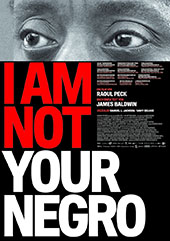 “I Am Not Your Negro shows how the later Baldwin, as he negotiated the politics of the mid-to-late 1960s and lived through the murders of Medgar Evers, Malcolm X, and Martin Luther King, Jr., became disillusioned about the possibility of any peaceful resolution to racism. Though the film hints at Baldwin’s emergent anti-capitalism, attention to the texts Peck draws from reveal the force with which Baldwin began to see American capitalism, nationalism, normative sexuality, and whiteness as inextricably bound. To address racism, then, he came to believe, would require a fundamental transformation of society. More likely, though, America would burn itself to the ground.”
“I Am Not Your Negro shows how the later Baldwin, as he negotiated the politics of the mid-to-late 1960s and lived through the murders of Medgar Evers, Malcolm X, and Martin Luther King, Jr., became disillusioned about the possibility of any peaceful resolution to racism. Though the film hints at Baldwin’s emergent anti-capitalism, attention to the texts Peck draws from reveal the force with which Baldwin began to see American capitalism, nationalism, normative sexuality, and whiteness as inextricably bound. To address racism, then, he came to believe, would require a fundamental transformation of society. More likely, though, America would burn itself to the ground.”
Read the full article here.
Spread the word!
New Lit on the Block :: Breathe Free Press
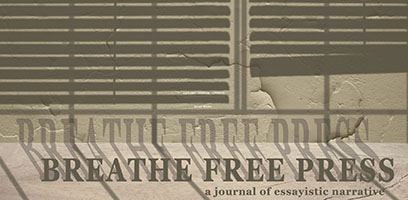 Emma Lazarus’ sonnet “The New Colossus” has gained new popular attention of late, thanks in part to White House senior policy adviser Stephen Miller’s comments dismissing the value of its message to immigrants. But, before Miller, this poem engraved on The Statue of Liberty was the inspiration for Breathe Free Press, a magazine the Editor Deborah Di Bari says was “founded in great part to resist the Trump administration’s oppressive policies.” Continue reading “New Lit on the Block :: Breathe Free Press”
Emma Lazarus’ sonnet “The New Colossus” has gained new popular attention of late, thanks in part to White House senior policy adviser Stephen Miller’s comments dismissing the value of its message to immigrants. But, before Miller, this poem engraved on The Statue of Liberty was the inspiration for Breathe Free Press, a magazine the Editor Deborah Di Bari says was “founded in great part to resist the Trump administration’s oppressive policies.” Continue reading “New Lit on the Block :: Breathe Free Press”
Spread the word!
Poetry :: Letter to America
An exerpt from “Darling America” by Kelli Russell Agodon from the ongoing series of Letter to America published on Terrain.org:
… Listen, the dolls in my dollhouse
Listen, the dolls in my dollhouse
are being deported and the landlord is typing
in all caps. How do we recognize humanity
when we’re just a name on a screen? An avatar
of a flag or resist, a red cap or a pink hat?
We’re holding the door for people, until we know
how they voted then we’re tripping each other
into the future, getting high off how fast they fall.
…
Read the full poem and hear it read by the author here.
Spread the word!
Books :: 2017 Rattle Chapbook Prize Winner
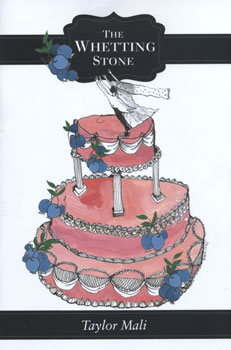 Subscribers to Rattle magazine will find a nice surprise with their Fall 2017 issue: a copy of the 2017 Rattle Chapbook Prize Winner, The Whetting Stone by Taylor Mali. In The Whetting Stone, Mali explores his wife’s suicide, her life, their love, and Mali’s guilt and resilience, with poetry that is stark and accessible.
Subscribers to Rattle magazine will find a nice surprise with their Fall 2017 issue: a copy of the 2017 Rattle Chapbook Prize Winner, The Whetting Stone by Taylor Mali. In The Whetting Stone, Mali explores his wife’s suicide, her life, their love, and Mali’s guilt and resilience, with poetry that is stark and accessible.
If you’re not already a subscriber to Rattle, you can still order individual copies of The Whetting Stone (which features cover art by the talented Bianca Stone) from the magazine’s website. While there, consider subscribing to Rattle to be sure you receive the Rattle Chapbook Prize winner directly in your mailbox next year.
Spread the word!
Southern Humanities Review 50th Anniversary
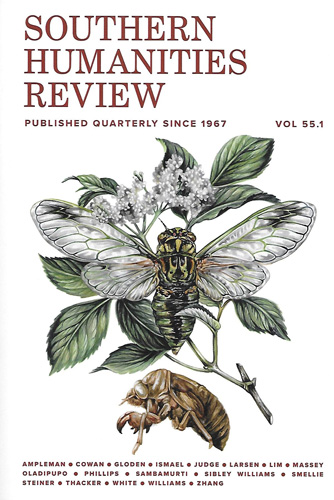 Publishing fiction, poetry, and essays from the Department of English at Auburn University, Alabama, Southern Humanities Review celebrates 50 year in print with volume 51.1. The issue features an essay by Greg Varner; fiction by Craig Bernardini, Megan Fahey, Beck Hagenston, Ted Morrissey, and Hannah Pittard; and poetry by Jessica Rae Bergamino, Marci Calabretta Cancio-Bello, Tarfia Faizullah, Joe Jiménez, Elizabeth Langemak, Kamilah Aisha Moon, Melissa Mylchreest, Sam Ross, sam sax, Derek Sheffield.
Publishing fiction, poetry, and essays from the Department of English at Auburn University, Alabama, Southern Humanities Review celebrates 50 year in print with volume 51.1. The issue features an essay by Greg Varner; fiction by Craig Bernardini, Megan Fahey, Beck Hagenston, Ted Morrissey, and Hannah Pittard; and poetry by Jessica Rae Bergamino, Marci Calabretta Cancio-Bello, Tarfia Faizullah, Joe Jiménez, Elizabeth Langemak, Kamilah Aisha Moon, Melissa Mylchreest, Sam Ross, sam sax, Derek Sheffield.
Spread the word!
Books :: 2016 Able Muse Book Award
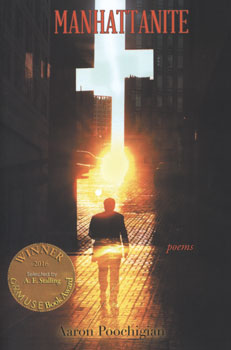 Able Muse Press annually holds the Able Muse Book Award, which offers a $1,000 prize, plus publication of the winning manuscript. The 2016 winner was recently published: Aaron Poochigian with Manhattanite.
Able Muse Press annually holds the Able Muse Book Award, which offers a $1,000 prize, plus publication of the winning manuscript. The 2016 winner was recently published: Aaron Poochigian with Manhattanite.
A. E. Stallings, 2016 Able Muse Book Award judge and author of Olives, writes in the Manhattanite foreword: “This collection is a celebration of exuberant melancholy, or melancholy exuberance, slick lyric cum urbane pastoral. [ . . . ] Poochigian’s verse is never taciturn: like a Broadway musical, it is always bursting into song [ . . . ].”
Readers can check out four poems from the collection on the Able Muse website, where copies of Manhattanite can also be purchased.
Spread the word!
2016 Mary C. Mohr Award Winners
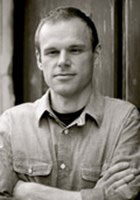 Winners of the annual Mary C. Mohr Awards in fiction and poetry appear in the Spring 2017 issue of Southern Indiana Review. Each winner receives $2000 and publication. Entries for the 2017 award are open until October 2.
Winners of the annual Mary C. Mohr Awards in fiction and poetry appear in the Spring 2017 issue of Southern Indiana Review. Each winner receives $2000 and publication. Entries for the 2017 award are open until October 2.
2016 Mary C. Mohr Poetry Award Winner
Selected by Jericho Brown
“manhood” by Richard Thompson
2016 Mary C. Mohr Fiction Award Winner
Selected by Adam Johnson
“The One Good Thing About Las Vegas, Nevada” by Bradford Kammin [pictured]
Spread the word!
Lit Mag Covers :: Picks of the Week
“Decompose #4” by Taylor Torres is featured on the cover of The Boiler, an online quaterly of poetry, fiction, and nonfiction from emerging and established authors, as well as artwork.
Thread is an online “intersectional feminist arts collective” publishing visual art, poetry, prose and creative nonfiction bimonthly.
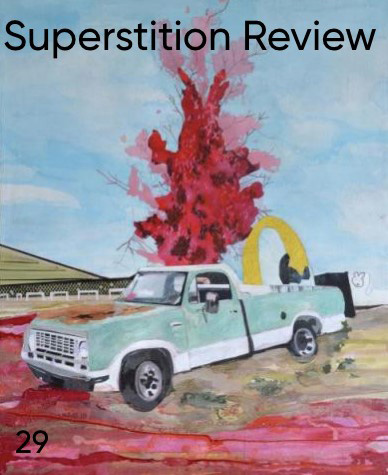 The work of artist and activist John Sproul is featured on the cover of Superstition Review #19.
The work of artist and activist John Sproul is featured on the cover of Superstition Review #19.
Spread the word!
Read & Listen Entre Rios Books
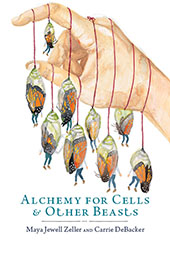 Entre Rios Press offers readers several new titles that will come with free audio download.Publisher Knox Gardner has been working closely with the book designer and audio producer. He tells me, “When I get the audio back from the studio, I am always startled to hear something new about the poems. I love it.” Gardner says they will have audio on all of their books and these first three will be available for free download for all listeners (not password protected). Samples are currently available on their website or here on their SoundCloud station. Entre Rios is also working to include an interview/discussion with Maya Zeller and Carrie DeBacker as part of their audio download.
Entre Rios Press offers readers several new titles that will come with free audio download.Publisher Knox Gardner has been working closely with the book designer and audio producer. He tells me, “When I get the audio back from the studio, I am always startled to hear something new about the poems. I love it.” Gardner says they will have audio on all of their books and these first three will be available for free download for all listeners (not password protected). Samples are currently available on their website or here on their SoundCloud station. Entre Rios is also working to include an interview/discussion with Maya Zeller and Carrie DeBacker as part of their audio download.
Flowers & Sky: Two Talks by Aaron Shurin
Mary’s Dust poems by Melinda Mueller with music by Lori Goldston
Alchemy for Cells & Other Beasts poetry and art by Maya Jewell Zeller and Carrie DeBacker
Spread the word!
Aquifer Now Open to General Submissions
 After the first few months of getting their online feet wet, Aquifer: The Florida Reviw Online is now open for general submissions. Writers are encouraged [as always] to review the publication content to make sure their writing is a good fit before submitting. “We are seeking top-quality digital stories, graphic narrative, creative nonfiction, fiction, and poetry” the editors say. TFR is also introducing a January annual $50 “staff picks” award from among all the authors published in the print TFR and Aquifer.
After the first few months of getting their online feet wet, Aquifer: The Florida Reviw Online is now open for general submissions. Writers are encouraged [as always] to review the publication content to make sure their writing is a good fit before submitting. “We are seeking top-quality digital stories, graphic narrative, creative nonfiction, fiction, and poetry” the editors say. TFR is also introducing a January annual $50 “staff picks” award from among all the authors published in the print TFR and Aquifer.
Spread the word!
Fiddlehead 2017 Summer Fiction Issue
 Fiddlehead Fiction Editor Mark Anthony Jarman introduces this issue’s contents as a showcase of “great, sensuous stories from the east coast and west coast and around the world,” and adds that the issue also features a nonfiction work, “The Foxes of Prince Edward Island,” by Matthew Ferrence. “. . . it is our desire,” Jarman explains, “to include more creative nonfiction in future issues of The Fiddlehead.” Readers can find Jarman’s introduction and Eden Robinson’s story “Nanas I Have Loved” available to read online.
Fiddlehead Fiction Editor Mark Anthony Jarman introduces this issue’s contents as a showcase of “great, sensuous stories from the east coast and west coast and around the world,” and adds that the issue also features a nonfiction work, “The Foxes of Prince Edward Island,” by Matthew Ferrence. “. . . it is our desire,” Jarman explains, “to include more creative nonfiction in future issues of The Fiddlehead.” Readers can find Jarman’s introduction and Eden Robinson’s story “Nanas I Have Loved” available to read online.
Spread the word!
Under the Sun :: CNF for the Classroom
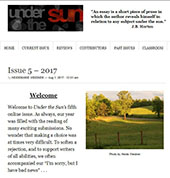 Under the Sun online creative non-fiction annual offers teachers “Ten reasons why our online journal would be a good choice in your writing courses,” including the fact that the editors are teachers and writers themselves. They’ve tested Under the Sun in their own classrooms to positive feedback from students. And students – you have a voice! Let your teachers know about Under the Sun and other great, free access, literary and alternative magazines at NewPages!
Under the Sun online creative non-fiction annual offers teachers “Ten reasons why our online journal would be a good choice in your writing courses,” including the fact that the editors are teachers and writers themselves. They’ve tested Under the Sun in their own classrooms to positive feedback from students. And students – you have a voice! Let your teachers know about Under the Sun and other great, free access, literary and alternative magazines at NewPages!
Spread the word!
Congrats 2017 Poetry Marathoners!
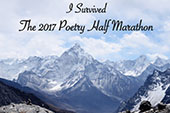 For either 12 or 24 hours starting at 9am on August 5, 2017, an elite group of writers entered into – and finished – the annual Poetry Marathon. This was my second year I entered only the half marathon, writing one poem per hour for 12 hours, from 9am – 9pm.
For either 12 or 24 hours starting at 9am on August 5, 2017, an elite group of writers entered into – and finished – the annual Poetry Marathon. This was my second year I entered only the half marathon, writing one poem per hour for 12 hours, from 9am – 9pm.While this may sound ‘easy’ enough at first thought, it’s a far more grueling commitment than most can imagine – just like running a marathon or half marathon. I mean, how many of us can run? Run a mile? Run five or ten? It’s when the miles – and poems and hours – start adding one on top of another that the breakdown enters in. In marathon running, they call it “hitting the wall.” Even though running – or writing poetry – is something you love to do, the constraints of time and goal of a numerical accomplishment push that relationship to its limits.
Started by Caitlin Jans (Thompson) and Jacob Jans in 2011, there have since been six marathons. Every year, hundreds enter their names to compete, and every year, only a fraction of those actually do. This year, 95 poets successfully completed 24 poems in 24 hours and 123 poets successfully completed 12 poems in 12 hours. Congratulations to all on this accomplishment! See a full list of the ‘winners’ here, where the poems are posted via a WordPress site, and the organizers just closed submissions for the second annual anthology of winners’ submissions.
If you missed the marathon this year – and the five other times it’s been held – you may or may not still have a chance to enter. Caitlin and Jacob have announced that the future of the marathon is up in the air. They are looking for someone who might be interested in helping run it, or other options for keeping it going. It’s clearly no ‘easy’ task on their end either, but their efforts to date have been immensely appreciated. I’m sure every one of us who has successfully completed this challenge will forever hold a sense of pride in that accomplishment. As well we should!
Spread the word!
The Malahat Review 2017 Long Poem Prize Winners
 The winners of The Malahat Review Long Poem Prize appear in the Summer 2017 issue and interviews with each poet are available to read on the publication’s website. Winners receive $1000 and publication. Contest judges: Louise Bernice Halfe, George Elliott Clarke, and Patricia Young.
The winners of The Malahat Review Long Poem Prize appear in the Summer 2017 issue and interviews with each poet are available to read on the publication’s website. Winners receive $1000 and publication. Contest judges: Louise Bernice Halfe, George Elliott Clarke, and Patricia Young.
John Wall Barger, “Smog Mother”
Read the interview with John Wall Barger here.
Délani Valin [pictured], “No Buffalos”
Read the interview with Délani Valin here.
Spread the word!
Driftwood Press – Summer 2017
Some of my favorite literary magazines are those that introduce and connect me to artists and writers I was unfamiliar with prior to reading. While it’s definitely nice to read work by favorites, I am always open to finding something new. The latest issue of Driftwood Press accomplishes this twofold. First, it introduced me to a cover artist I was unfamiliar with. Second, it connected me to writers, each piece accompanied by an interview with its creator.
Spread the word!
Fiction Southeast – 2017
Fiction Southeast has a tagline that reads, “An online journal dedicated to short fiction.” The dedication is readily apparent with one look at their site; there are loads of stories stacked as far down as you can scroll. Short fiction almost literally as far as the eye can see! The more recent fiction pieces have a lot to offer in terms of subject matter and character.
Spread the word!
concīs – Spring 2017
An online journal devoted to brevity and where genre isn’t important. The work that appears in concīs shows up first on the homepage and then is later compiled into a seasonal issue. One thing is for certain: concīs proves that length matters not when it comes to quality and the Spring 2017 seasonal issue bears this out.
Spread the word!
Mudfish – 2017
With no offense to anyone, it is refreshing to review a multi-genre collection coming from outside a university. That doesn’t make the contributors any better or worse from either source, but it does provide an added perspective. As a group, the contributors to Mudfish 19, are not aspiring student writers; they are practiced artists providing us with practiced skills that encourage thoughtful reading and reflection. The independence of a private press also gives us a much larger selection of authors, painters, and photographers than we can hope for in any one issue of a university press.
